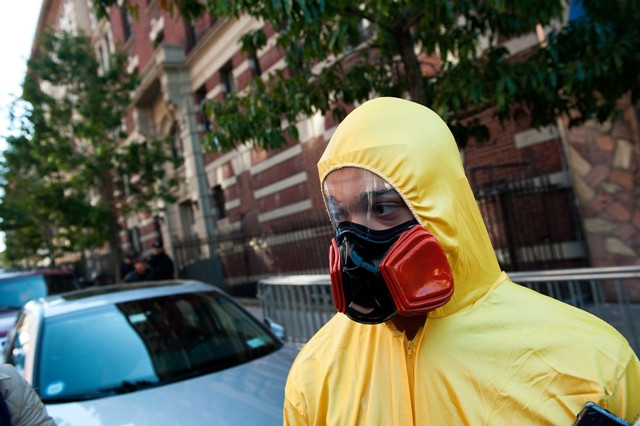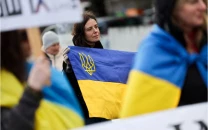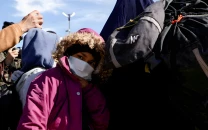Quarantined for helping Ebola patients, US nurse slams rules
Teen isolated, tested for Ebola virus in Australia

Kaci Hickox was the first person to enter mandatory 21-day quarantine for medics returning to parts of the United States who may have had contact with Ebola patients in West Africa.
The new rules took effect in New York and New Jersey on Friday, the same day Hickox returned.
She landed in New Jersey's Newark Liberty International Airport after working with Doctors Without Borders in Sierra Leone, hit hard by the hemorrhagic fever.
"This is not a situation I would wish on anyone, and I am scared for those who will follow me," Hickox wrote in The Dallas Morning News.
"I am scared about how health care workers will be treated at airports when they declare that they have been fighting Ebola in West Africa. I am scared that, like me, they will arrive and see a frenzy of disorganisation, fear and, most frightening, quarantine."
Hickox will be monitored at a New Jersey hospital for 21 days, the known incubation period of Ebola. She said she was showing no symptoms when she arrived.
Her account recalled the ordeal that began with her "grueling" two-day journey from Sierra Leone back to the United States.
Then, at the airport's quarantine office in immigration, "one man who must have been an immigration officer because he was wearing a weapon belt that I could see protruding from his white coveralls barked questions at me as if I was a criminal," Hickox said.
Despite feeling "tired, hungry and confused," Hickox said she tried to remain calm during the three hours that passed in the office.
"No one seemed to be in charge. No one would tell me what was going on or what would happen to me," she said. "I wondered what I had done wrong."
Hickox's temperature was initially a normal 98 degrees Fahrenheit. But four hours after she landed, a forehead scanner found it to be 101 degrees, suggesting fever.
"The forehead scanner was recording an elevated temperature because I was flushed and upset," Hickox said, adding that she was left alone in the room for another three hours.
No less than eight police cars then escorted her to the hospital.
"Sirens blared, lights flashed. Again, I wondered what I had done wrong," Hickox wrote.
"I had spent a month watching children die, alone. I had witnessed human tragedy unfold before my eyes. I had tried to help when much of the world has looked on and done nothing."
At the hospital, her temperature was again normal and an initial blood test came back negative for Ebola.
"I sat alone in the isolation tent and thought of many colleagues who will return home to America and face the same ordeal. Will they be made to feel like criminals and prisoners?" Hickox wrote.
"We need more health care workers to help fight the epidemic in West Africa. The US must treat returning health care workers with dignity and humanity," she wrote.
Teen isolated, tested for Ebola virus in Australia
Australian authorities said Sunday a teenager was in isolation in hospital and undergoing tests for Ebola after she developed a fever following her arrival from Guinea.
The 18-year-old, who arrived in Australia 11 days ago with eight other family members, had been in home quarantine in Brisbane before she developed a "raised temperature" overnight, Queensland state chief health officer Jeannette Young said late Sunday.
She was now in isolation at the Royal Brisbane and Women's Hospital, with the results of the first test for Ebola to be known early Monday.
A second test would be taken in three days, Young added, saying it was unlikely she was suffering from Ebola.
"She didn't have any known contact with anyone that was sick with Ebola virus disease, but she did come from an area that had a reasonably large number of cases," Young told a press conference, adding that the young woman was not a healthcare worker.
Young would not specify the teenager's nationality, but said she was moving to Australia permanently and authorities had been informed of her family's arrival several days before the flight.
"There is no risk to the community at all because she hasn't left the house or had any visitors in the time that she has been here in Brisbane," Young said.
The teenager was not showing other symptoms and her fever was "resolved", Young added.
"It is unlikely that she has the disease because she doesn't remember coming into contact with anyone with Ebola virus disease, so it is unlikely, but she has been in an area that there's been a significant number of cases, so there's always that potential."
The rest of the woman's family remain quarantined at home.
Young said Queensland health authorities were monitoring four families from Guinea, Liberia and Sierra Leone, where the vast majority of Ebola cases have occurred.
The number of Ebola infections has surpassed 10,000 and the death toll neared 5,000 worldwide, mainly in the three West African nations.
There have been no confirmed Ebola cases in Australia.



















COMMENTS
Comments are moderated and generally will be posted if they are on-topic and not abusive.
For more information, please see our Comments FAQ